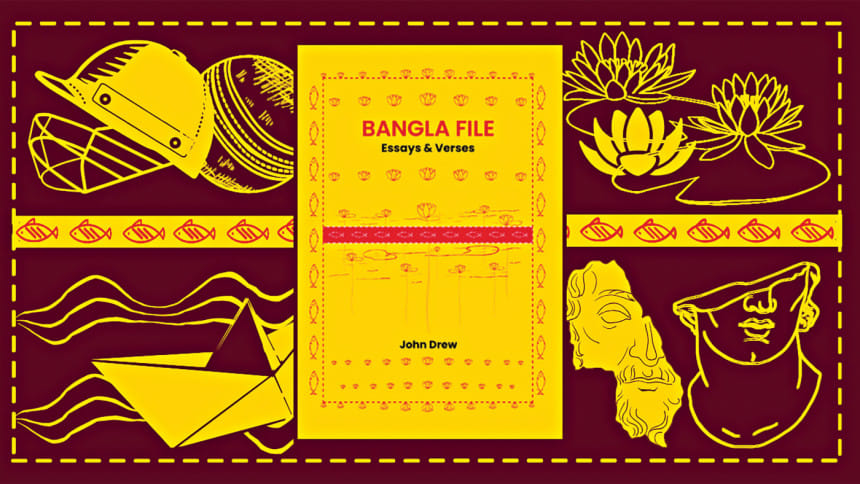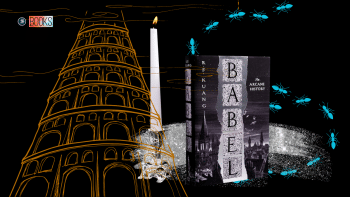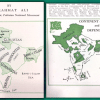A peripatetic poet’s pleasing musings

The title of this book suggests that it is based in Bengal but it really meanders deftly across time and space, more often than not in "mazy motion". Not surprising this, when one keeps in mind that John Drew, its author, wrote the 1987 OUP book, titled, India and the Romantic Imagination. Indeed, three of the essays collected in the book centre on three major English Romantic poets—Coleridge, Shelley, and Keats. Shakespeare's romantic comedy, A Midsummer Night's Dream, features in another essay. The very "Romantic" Bangali poet, "Rabindra", features in yet another. It will not take long for a reader embarking on the print journey across the book to realise that its author is a poet who is incorrigibly romantic and endearingly whimsical.
"The People's Game" is cricket—of course. Drew's peregrinations on this occasion begins in "the Kentish Downs above the River Thames".
Drew is also in the tradition of what was once fondly called "a man of letters". A bibliophile, he loves books for the worlds they contain in them; they are for him magic casements. But he is also an inveterate traveller across physical space, someone in an English tradition where travelling across continents, meeting the peoples of the world, and savouring the distinct as well as the universal flavours of other culture(s) give the traveller endless pleasure.
Reading Drew's book reveals that he is immensely learned; he is also someone who wears his learning lightly on his sleeve. The inside back cover of Bangla File introduces its author well: Drew is a "raconteur", "a peripatetic poet"; a scholar and a creative writer of prose who has lived/worked/taught in many places of the world, including England, India, Canada, and China. He has been a journalist as well. What is more, he is as passionate about cricket as he is about history, geography, and literature!
Not surprisingly, then, Bangla File is something of a literary smorgasbord. All a review can do is make readers sample some of its offerings. Take "Figures in a Landscape: Glimpses of the People's Game", placed almost at the centre of the collection, as a particularly delectable sample of Drew's offerings. "The People's Game" is cricket—of course. Drew's peregrinations on this occasion begins in "the Kentish Downs above the River Thames". He moves on to mentioning (presumably British) "sailors playing cricket near Aleppo in 1676 and again near Jambusar in India in 1721". Next, we are taken to a place near Bagerhat where the man guiding Drew and other tourists on a Sundarbans trip ("an ageing hippie born to Pink Floyd out of Lalon Shai"!) wants to best him in hitting "the trunk of a tree with a crook stick". Drew then depicts boys playing "water cricket" besides one of Khan Jahan Ali's Bagerhat mosques. Next, we see Paharpur boys playing what people growing up in or near old Dhaka would know as "danda guli". But then he sights the game proper being played in Mohammadpur and Dhanmondi. Such fascinating meandering across cricket's history and geography and past and present climaxes for the reader in Dhaka Club, where Drew meets a member who claims to have played cricket in England under David Gower. And the actual ending of the essay? Cambridge—where the reader is made to view girls, as well as boys, playing the game!
Another example of Drew's prose peregrinations is "On Shelley, Shoes and the Shifting of Statues." It begins in the magical Mysore writer R K Narayan's imaginary town, Malgudi, where its opportunistic Mayor is bent on taking down the statue of the "tyrannical British imperialist Sir Frederic Lawley". But he fails to do so, for Malgudi people think of the Englishman as anything but a tyrant. This is the cue for Drew to draw our attention to Bristol where, in 2020, an attempt was made to bring down the slave trader Edward Colston's statue. But Colson was a "local benefactor" and so the statue eventually gets, so to speak, new life, for it is subsequently put in a Bristol museum by those who remember him fondly. This reminds Drew of the Bristol statue of Edmund Burke, the man who led the proceedings to impeach Hastings because of excesses committed by the East India Company people during his reign, although, paradoxically, Burke admired the "scavenging Clive", the prototypical coloniser. Drew notes wryly that Clive's statue is quite erect to this day in contemporary Kolkata. Drew is ironic also about Winston Churchill's statue in London's positioning next to that of Gandhi's. Such putting up and down of statues and their placements strike Drew as acts verging on the absurd and testaments to unending "Culture Wars". He can't help but noting the "absurdity of having statues at all" by citing the case of Shelley, "England's most visionary poet", for his statue is now in the Oxford college that had actually expelled him! Drew's sage-like conclusion—humankind may never stop erecting or slighting statutes, but the fact is, "human beings have feet of clay!"
Let me provide one final example of the way Drew weaves his Bangla File essays across time and space delightfully but wisely by discussing his essay, "The Once and Future Bedes & Gypsies". Incorrigible traveller that Drew is, he is attracted to these "vagrant, nomadic, outcastes". But referring to Kazi Nazrul Islam's play Baner Bede, he notes how the Bangali poet had written approvingly of the Bedes, because he had felt that "the whole world is their home". Drew's essay then refers to sympathetic treatment of gypsies in Walter Scott's Guy Mannering, Arnold's poem about a "scholar-gypsy", and a short story by the Welsh writer Alun Lewis, where a band of gypsies in India comes to the rescue of a British officer stranded with the body of a truck driver in his unit. Drew knows that Bedes in Bangladesh are looked down upon and as unwelcome in the country as are gypsies elsewhere, but he contrasts their "subsistence life style" with "the universally predominant life style of conspicuous consumption" that is posing to be such a threat to the environment in the age of the anthropocene.
The poems collected in Bangla File reveal like its prose pieces Drew's wide-ranging, wise, and wry takes on themes and issues that stirred him in his travels around the world. His prose piece on "The Englishing of Omar Khayyam" has an unattributed "ruba'i" poem in it—no doubt inspired by Edward Fitzgerald—which could very well be by Drew. Readers come across in the book his "A Version of Ghazal" which uses the four line stanza form deftly as well as wittily. And there is in the collection "Sourav's Song", whose concluding stanza startles us with its tribute to one of Bengal's revered mystic poets: "dervish, sweeper, weaver, king/A friend to guide us, that you are,/saint and singer, Lalon Shah."
The very last page of Bangla File recalls Lalon again, somewhat wistfully, for Drew reflects here on the message of poets who tend not to be sighted by people whose imaginations are land-locked. But the concluding sentences of the book reveals Drew's refusal to mourn the death of poetry, or for that matter, the creative imagination, for not a few marginalised minds will meander creatively forever. As he puts it, surely self-reflexively, "A book marooned on the high shelf may have had a long and strange journey to get there." But there is no reason to despair: "if ever taken down, it may go on even longer and stranger journeys. So may a bibliophile."
Get a copy of John Drew's Bangla File asap and read its prose pieces and poems; the book is a magic casement that will take you on long and strange journeys which will open up worlds you will be charmed by and recognise as strange and yet all too familiar!
Fakrul Alam is Bangabandhu Chair Professor, University of Dhaka.

 For all latest news, follow The Daily Star's Google News channel.
For all latest news, follow The Daily Star's Google News channel. 









Comments